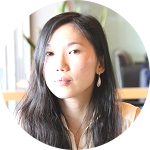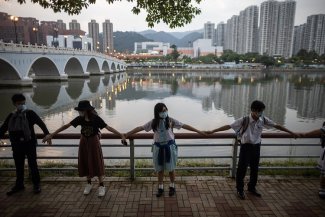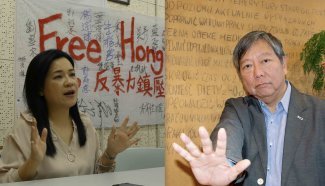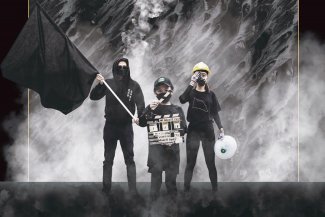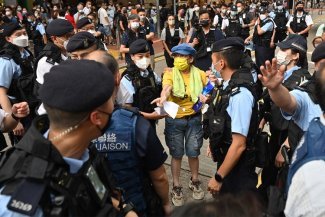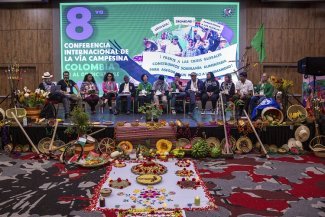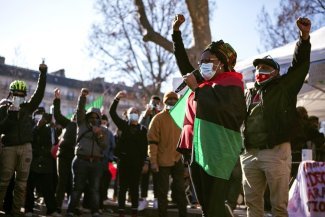Barrister Chow Hang-tung (centre), vice-chairwoman of the Hong Kong Alliance in Support of Patriotic Democratic Movements in China, speaks to reporters in Hong Kong on 5 September 2021. Chow and six other members of the alliance involved in organising Hong Kong’s annual Tiananmen Square candlelit vigil were arrested on 8 and 9 September, after the group refused to cooperate with a national security investigation.
Over the past few months, with scores of pro-democracy figures thrown in jail, fleeing abroad, or simply lying low amid a tense political climate, Tonyee Chow Hang-tung has emerged as a conspicuous voice of dissent in Hong Kong. Whether locked up or free, the 36-year-old lawyer and activist has shown no restraint in criticising and challenging the authorities. She has defied an order to cooperate with police in a probe she deems preposterous, urged Hongkongers to “continue to resist”, and called a charge against her “ridiculous” before a court. These are bold moves, given Beijing’s ongoing drive to crush dissent in the former British colony.
“I’m fighting a battle I believe I should fight, so I’m ready to bear whatever consequences there may be,” she told Equal Times recently when commenting on her irrepressible urge to speak up. Shortly afterwards, she was arrested…for the third time in three months. This time, she is likely to remain behind bars for a significant period of time with four charges under her belt, including one count of inciting subversion of state power that carries a maximum sentence of 10 years’ imprisonment.
The battle in Chow’s words is one between Hong Kong’s pro-democracy forces and the powers that be. It has been waging for nearly two decades and has now reached a turning point where the pro-democracy camp is suffering a crushing defeat at the hands of an ever more assertive Beijing. Hongkongers from different quarters are left facing an uncertain future.
When the Asian financial hub was handed over to China from Britain in 1997, China promised Hongkongers their freewheeling city would enjoy “a high degree of autonomy” for 50 years under the “one country, two systems” principle. For pro-democracy advocates, how-ever, the Chinese Communist Party has failed to honour this promise, as it has persistently curtailed Hong Kong’s semi-autonomy. Efforts to halt the decline and fight for greater democracy exploded during the 2014 ‘Umbrella Movement’ that spanned 79 days. In June 2019, a controversial bill on extradition to mainland China reignited the flame of the pro-democracy movement, this time on a larger, more disruptive scale, lasting for more than seven months and turning violent over time.
Eventually, Beijing quelled the turmoil by imposing a draconian national security law on Hong Kong. Punishable by a maximum of life imprisonment, the law has created four offences: secession, subversion, foreign collusion, and terrorism.
The legislation is partly anchored in Beijing’s belief that Westernised Hong Kong is being used as a proxy by the West in a broader fight against China. According to Beijing and Hong Kong officials, with the new law, stability has returned and the basic rights and freedoms of Hongkongers are better protected. But many people think otherwise.
Since the security law took effect in June 2020, over 150 pro-democracy politicians, activists and journalists in Hong Kong have been arrested for violating it. Dozens have been charged and many of them denied bail and detained for months while awaiting trial. Prison sentences have also been meted out to some of the most prominent activists for protest-related charges. The city’s mini parliament has been gutted of its opposition following the disqualification, mass resignation and exile of opposition lawmakers. The electoral system has been revamped so that only “patriots” can occupy positions of political power. A national security hotline has been created to encourage citizens to report each other anonymously. Many trade unions and civil society groups have disbanded under duress. Over the past year, about 90,000 residents have left Hong Kong in a new wave of migration. Those who stay put are wary of their speech and actions in public because, according to critics, the new law is so broad and so vague that it is hard to know whether one has broken it until it is too late.
Dismantling civil society and the free press
Last month, yet another long-standing civil group was swept up by the tidal wave of the security law, prompting criticism that it is being used by Beijing to dismantle civil society in Hong Kong. The Hong Kong Alliance in Support of Patriotic Democratic Movements of China had for three decades consistently held the world’s largest vigil commemorating the 1989 Tiananmen crackdown, an annual event that set Hong Kong apart from mainland China, where commemoration of the massacre is prohibited. Now the moderate group is being labelled by authorities as a ‘foreign agent’ and the last two vigils were banned on the grounds of Covid.
Police recently ordered Chow, the vice-chair, and some other members to provide the group’s membership and financial information. When they refused, police arrested Chow and three other members on 8 September. Charged with failing to comply with the requirement to provide information for a national security investigation, they could face up to two years’ imprisonment. Chow and two other Hong Kong Alliance core members, including chairperson and trade union leader Lee Cheuk-yan, and the group itself, are also charged with inciting subversion of state power under the national security law.
Prior to her arrest, Chow already expected to be jailed in the near future, as she faces two other charges of inciting others to participate in the banned Tiananmen vigils. Her ability to brave impending hardship has often manifested itself in jokey social media posts and a tendency to end every other sentence with a chuckle. What has bothered her though, is that her uncertain future has made it impossible for her to take on new cases at her law firm. This is frustrating, especially when a growing number of lawyers are leaving the city, and some of those who remain, according to Chow, are practising “self-censorship” in that they dare not handle national security law cases.
Chow, who has represented two politicians in a high-profile, ongoing security law case involving 47 pro-democracy politicians and activists, explains: “There is no red line, yet. No one has been harassed for taking on national security law cases. But they avoid these cases as they want to do business with mainland [Chinese] clients.”
The Hong Kong-trained barrister believes the long-held notion that lawyers can help bring justice in the courts is wearing thin in Hong Kong, given the “ridiculous” court rulings in some protest-related cases. “But lawyers still have an important role to play as long as the state needs courts as a veil of shame to cover its political repression,” she says.
Meanwhile, journalism is another sector feeling the heat. In June, shockwaves ran through Hong Kong’s once vibrant media landscape when the 26-year-old Apple Daily, a tabloid-style broadsheet critical of Beijing, was forced to fold after six senior journalists and executives were arrested under the security law.
By then, the newspaper’s outspoken founder Jimmy Lai had already been behind bars for half a year for breaching the law and other charges. In December, a cable TV network fired 40 staff members in what was deemed a political crackdown. At the public broadcaster RTHK, at least six popular programmes have been axed, online archive contents have been removed, and staff have been ordered to use Beijing-approved language.
Shirley Leung, a journalist who lost her job at Apple Daily after its closure, says that while in the past the media was “a frog being slowly boiled alive”, the heat has been drastically turned up. “Now it’s harder to do in-depth investigations…[.] Journalists are working under ever more constraints,” she says.
As a feature writer, one big challenge that Leung currently faces is finding people who will talk to her – most prominent pro-democracy figures are now in jail, and ordinary people are also fearful about speaking openly because of the security law. Leung has imagined being arrested herself, but she tries not to let the law get the better of her. She is currently publishing a series of articles about Hongkongers involved in the 2019 movement.
“I see myself as a chronicler. The year 2019 has great significance in Hong Kong’s history. Events that year should be recorded…so that they won’t get erased or twisted later. Today you still hear some people say June 4th [the date of the Tiananmen Square massacre] never happened. That’s terrible,” she says.
“Trade unionists are living in unprecedented fear”
In the latter part of the 2019 protest movement, many pro-movement employees from different sectors formed new trade unions. By expanding as a force, they hoped to secure seats in the city’s legislature and contribute to electoral politics. Consequently, the total number of registered unions shot up to 1,410 in 2020 from 917 in 2019. For a while, there was a hope that trade unions could become a force to be reckoned with in capitalistic Hong Kong, where the culture of labour unions is weak.
The optimism proved short-lived. The current political climate is putting many unionists on tenterhooks. Activities they used to take for granted, including staging protests, criticising authorities and seeking solidarity abroad, could now get them into trouble. On 19 September, the independent Hong Kong Confederation of Trade Unions (HKCTU), announced that it would disband, citing external threats to members’ personal safety without elaborating. Two HKCTU core members are already locked up: chairperson Carol Ng is remanded in custody for breaching the security law, while general secretary Lee Cheuk-yan is serving 20 months in prison for protest-related charges. Chief executive Mung Siu-tat recently fled Hong Kong.
“The trade union sector is now living in unprecedented fear,” says a veteran unionist who spoke to Equal Times on condition of anonymity. “When the national security law arrived, political groups were the primary target. In July and August, it became clear that trade unions are also a main target.”
In July, five members of a speech therapists’ trade union were arrested for sedition over three children’s books. The allegorical ebooks portray protesters in the 2019 movement as sheep in a village surrounded by menacing wolves. Police said they attempted to arouse ‘hatred’ towards the government and ‘incite violence’. In August, the Professional Teachers’ Union, Hong Kong’s largest single-industry trade union with 95,000 members, dissolved after pro-Beijing media labelled it a “malignant tumour” infiltrating schools with pro-democracy politics.
“But it’s not that trade unions want to get into politics; it’s politics that’s affecting us,” says the veteran unionist. Precisely how many trade union members are left in the city is unclear, but what matters more today, he says, is for like-minded unionists to stay connected. “[The authorities] can disqualify trade unions, but they can’t disqualify the bonds between people.”
Come October, the speech therapists’ union will be deregistered by the government. The unionist believes the implications of the crackdown go beyond trade unions; the crackdown also portends an erosion of artistic freedom in Hong Kong under the overriding theme of national security.
Self-censorship in films
In filmmaking, the erosion has already happened. In August, a censorship ordinance was introduced allowing authorities to scrutinise films (including already-released titles) for national security breaches. Offenders could face up to three years in jail.
When film director Kiwi Chow first heard about the ordinance, he burst into laughter. “Sometimes you can only laugh at all the absurd things happening in Hong Kong,” he says. “I’m not surprised. I expected that to happen. In the past they were more subtle. Now they are simply blatant.”
The award-winning filmmaker himself is apparently on the authorities’ radar. A recent private screening of his blockbuster romantic drama was raided by police. That came shortly after his new film Revolution of Our Times premiered at the Cannes Film Festival in July. A “compelling and crucial piece of journalism” about the 2019 protests, the 150-minute production was included at the eleventh hour into Cannes’ programme line-up as a ‘surprise documentary’, presumably to minimise any diplomatic repercussions from China.
However, Revolution will not see the light of day in its home city. Because of security law risks, Chow has sold the film’s copyright to a European distributor and disposed of all his footage. He is the only identified crew member; everyone else is collectively described as ‘Hongkongers’ in the film’s end credits.
Such cautiousness was unthinkable in pre-national security law Hong Kong, where filmmakers had always enjoyed creative freedom. With the new censorship rules, Chow believes there will be no large-scale bans, but that films related to the city’s pro-democracy drive will be suppressed. Meanwhile, self-censorship is rife among local filmmakers.
“I know many Hong Kong filmmakers are now censoring their own films, big time. Some have deleted sensitive content in order to get a screening permit,” he says. “Those who spread fear are the ones to blame.”
Chow refuses to yield though. The 42-year-old, whose filmography includes the award-winning dystopian movie Ten Years, will stay in Hong Kong and keep making whatever films he wants to make. If push comes to shove, he will release his works abroad only.
“Self-censorship is what the regime wants me to do. I try to resist that because that’s un-just,” he says. He has contacted a lawyer and drawn up contingency plans with some friends in case he gets arrested. Yet his life goes on. He hits the beach with his family and picks up his son from school as usual.
“I don’t think one should indulge in fear. Objectively there are risks, but we can choose to live in fear or not. I’ve decided not to be controlled by fear.”
This unyielding approach is also adopted by Tonyee Chow. “I’m doing something I believe in. This puts me in a state of mind that is not unhappy,” she says. “I believe totalitarianism cannot last forever. Exactly when it’ll end, I obviously don’t know…but I don’t care that much. Doing the right things and going in the right direction is enough for me.”



